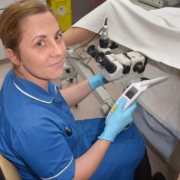Handheld cervical neoplasia detection system
ZedScan is a portable, handheld device that uses patented Electrical Impedance Spectroscopy (EIS) to detect the development of pre-cancerous abnormalities of the cervix, known as cervical intraepithelial neoplasia (CIN). The innovative system not only removes subjectivity and increases accuracy, but it also helps clinicians manage growing colposcopy referrals generated by the introduction of primary HPV testing. In a recent review of over 1500 women referred to an NHS colposcopy clinic, the adoption of ZedScan resulted in a significant increase in disease detection and improvements in clinical performance. The patient case study revealed a 13% increase in detection of high-grade disease (HGCIN) across all patients, with 50% increase reported in women with low-grade cytology. In 92% of these cases, disease was confirmed with a single biopsy. If rolled out across the UK, this would equate to an additional 200 women being identified with HGCIN every week, or approximately 10,000 women each year who can therefore be diagnosed and treated much earlier. Thus preventing disease from developing. Performance was not impacted by the hrHPV genotype with increased detection in both HPV16 and non 16 hrHPV positive women. Cervical cancer is the 7th most common disease globally, and the third most prevalent in woman. The disease is caused by the persistent high-risk human papillomavirus (HPV) infection, which triggers changes in the cervical cells. Although colposcopy is an important method in detecting cervical cancer, in practice, the procedure has not drastically changed over the last 90 years, and diagnosis depends on the subjective assessment of visual indicators by the clinician. An objective assessment will help clinicians to better manage patients and help avoid unnecessary biopsies, treatments and repeat follow-up appointments.


